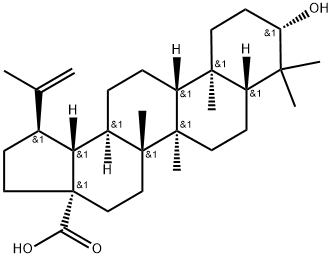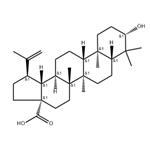Description
Betulinic acid (472-15-1) is a natural Lupane triterpenoid from white birch tree (Betula pubescens). Induces apoptosis in a variety of cell lines.1 Induces mitochondrial permeability transition pore opening.2 Acts as a chemosensitizer for anticancer drug treatment in chemoresistant colon cancer cell lines.3 Cell permeable.
Chemical Properties
colorless Needles
Uses
Betulinic acid (BetA) has been used:
- to test its effects as an antiviral agent against Dengue virus (DENV)
- as a sterol regulatory element-binding protein (SREBP) inhibitor to repress the lipid metabolism and proliferation of clear cell renal cell carcinoma (ccRCC) cells
- as a treatment to test its anti-tumor properties for cell viability and apoptotic cell death assays in multiple myeloma models
Uses
Betulinic Acid is a natural pentacyclic triterpenoid. Betulinic Acid displays anti-inflammatory and anti-HIV activity. Betulinic Acid selectively induces apoptosis in tumor cells by directly activati
ng the mitochondrial pathway of apoptosis through a p53- and CD95-independent mechanism. Betulinic Acid also exhibits TGR5 agonist activity
Definition
ChEBI: A pentacyclic triterpenoid that is lupane having a double bond at position 20(29) as well as 3beta-hydroxy and 28-carboxy substituents. It is found in the bark and other plant parts of several species of plants including Syzygium cla
iflorum. It exhibits anti-HIV, antimalarial, antineoplastic and anti-inflammatory properties.
General Description
Betulinic acid is a lupane-type triterpene, which can be prepared from betulin via oxidation using chromium oxide (VI). Along with anti-HIV-1 and anti-tumor activity, it also shows other bioactivities such as anti-inflammatory, antibacterial, in vitro antimalarial, anthelmintic and antioxidant activities.
Biological Activity
Natural triterpenoid that displays anti-HIV and antitumor activity. Induces the production of reactive oxygen species (ROS) and activates NF- κ B. Exhibits TRG5 agonist activity (EC 50 = 1.04 μ M).
Biochem/physiol Actions
Betulinic acid, a pentacyclic triterpene, selectively induces apoptosis in tumor cells by directly activating the mitochondrial pathway of apoptosis through a p53- and CD95-independent mechanism.
Anticancer Research
This compound is a pentacyclic triterpene obtained from Betula and Zizyphus species,which shows selective cytotoxicity against human melanoma cells (Shoeb2006). It generates reactive oxygen species, activates MAPK cascade, inhibitstopoisomerase I, inhibits angiogenesis, modulates pro-growth transcriptionalactivators, modulates the activity of aminopeptidase-N, and thereby inducesapoptosis in cancer cells (Desai et al. 2008; Fulda 2008).
Synthesis
Firstly, it is obtained by extraction and separation from natural plants. This method consumes a large amount of solvent, has a low yield, and the impurities are not easy to separate, so it is rarely used;
Secondly, betulinic acid is obtained by organic synthesis using betulinol as a precursor. This method has been applied to industrial production, can get industrial scale betulinic acid, is now the main source of betulinic acid on the market;
Third, with betulinol as the precursor, through the transformation of microorganisms to generate betulinic acid. This approach represents a new direction for the future of the plant extraction industry, but there are still many technical difficulties that have not been solved.
References
[1] H EHRHARDT. Betulinic acid-induced apoptosis in leukemia cells[J]. Leukemia, 2004, 18 8: 1406-1412. DOI:
10.1038/sj.leu.2403406[2] FRANZISKA B. MULLAUER Jan P M Jan H Kessler. Betulinic acid induces cytochrome c release and apoptosis in a Bax/Bak-independent, permeability transition pore dependent fashion[J]. Apoptosis, 2008, 14 2: 191-202. DOI:
10.1007/s10495-008-0290-x[3] GWON-RYUL JUNG. Effect of Betulinic Acid on Anticancer Drug-Resistant Colon Cancer Cells[J]. Basic & Clinical Pharmacology & Toxicology, 2007, 101 4: 277-285. DOI:
10.1111/j.1742-7843.2007.00115.x




